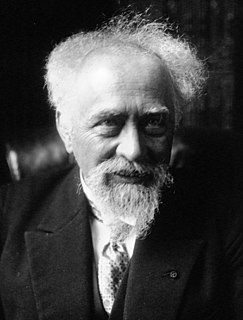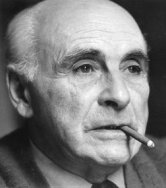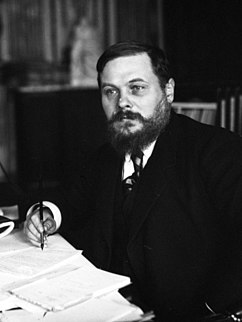Related Research Articles

Émile Théodore Léon Gautier was a French literary historian.

Auguste Émile Faguet was a French author and literary critic.

Ferdinand Brunetière was a French writer and critic.

Étienne Émile Marie Boutroux was an eminent 19th century French philosopher of science and religion, and an historian of philosophy. He was a firm opponent of materialism in science. He was a spiritual philosopher who defended the idea that religion and science are compatible at a time when the power of science was rising inexorably. His work is overshadowed in the English-speaking world by that of the more celebrated Henri Bergson. He was elected membership of the Academy of Moral and Political Sciences in 1898 and in 1912 to the Académie française.

Jean Baptiste Perrin was a French physicist who, in his studies of the Brownian motion of minute particles suspended in liquids, verified Albert Einstein’s explanation of this phenomenon and thereby confirmed the atomic nature of matter. For this achievement he was honoured with the Nobel Prize for Physics in 1926.

Alphonse Milne-Edwards was a French mammalologist, ornithologist and carcinologist. He was English in origin, the son of Henri Milne-Edwards and grandson of Bryan Edwards, a Jamaican planter who settled at Bruges.

Albert Gleizes was a French artist, theoretician, philosopher, a self-proclaimed founder of Cubism and an influence on the School of Paris. Albert Gleizes and Jean Metzinger wrote the first major treatise on Cubism, Du "Cubisme", 1912. Gleizes was a founding member of the Section d'Or group of artists. He was also a member of Der Sturm, and his many theoretical writings were originally most appreciated in Germany, where especially at the Bauhaus his ideas were given thoughtful consideration. Gleizes spent four crucial years in New York, and played an important role in making America aware of modern art. He was a member of the Society of Independent Artists, founder of the Ernest-Renan Association, and both a founder and participant in the Abbaye de Créteil. Gleizes exhibited regularly at Léonce Rosenberg’s Galerie de l’Effort Moderne in Paris; he was also a founder, organizer and director of Abstraction-Création. From the mid-1920s to the late 1930s much of his energy went into writing, e.g., La Peinture et ses lois, Vers une conscience plastique: La Forme et l’histoire and Homocentrisme.

Francis Jean Gaston Alfred Ponge was a French essayist and poet. Influenced by surrealism, he developed a form of prose poem, minutely examining everyday objects. He was the third recipient of the Neustadt International Prize for Literature in 1974.

Yves Guyot was a French politician and economist.

Emer (Emmerich) de Vattel was an international lawyer. He was born in Couvet in Neuchâtel in 1714 and died in 1767. He was largely influenced by Dutch jurist Hugo Grotius. He is most famous for his 1758 work The Law of Nations. This work was his claim to fame and won him enough prestige to be appointed as a councilor to the court of Frederick Augustus II of Saxony.

Gustave Lanson was a French historian and literary critic. He taught at the Sorbonne and the École Normale Supérieure in Paris. A dominant figure in French literary criticism, he influenced several generations of writers and critics through his teachings, which were anti-systematic and promoted a scrupulous and erudite approach to texts via extensive firsthand research, inventorying, and in-depth historical investigation.

Henri Rabaud was a French conductor and composer, who held important posts in the French musical establishment and upheld mainly conservative trends in French music in the first half of the twentieth century.
Albert Besson was a French hygienist, physician and member of the French Académie Nationale de Médecine.
Albert Schinz was an American French and philosophical scholar, editor, and professor of French literature. Although he was born in Neuchâtel, Switzerland, Schinz died in the United States at an Iowa State University Hospital, in Iowa City, of pneumonia.

Anatole le Braz, the "Bard of Brittany", was a Breton poet, folklore collector and translator. He was highly regarded amongst both European and American scholars, and known for his warmth and charm.

Albert Lebourg, birth name Albert-Marie Lebourg, also called Albert-Charles Lebourg and Charles Albert Lebourg, was a French Impressionist and Post-Impressionist landscape painter of the Rouen School. Member of the Société des Artistes Français, he actively worked in a luminous Impressionist style, creating more than 2,000 landscapes during his lifetime. The artist was represented by Galerie Mancini in Paris in 1896, in 1899 and 1910 by : Galerie Bernheim-Jeune, 1903 and 1906 at the Galerie Paul Rosenberg, and 1918 and 1923 at Galerie Georges Petit.

Emile Albert Métin was a French professor of history and geography, a prolific author and a politician who was twice Minister of Labor and Social Welfare.

Edgard Milhaud was a French professor of economics, a militant socialist and a promoter and theoretician of social economy.

Paul Bourdarie was a French explorer, journalist, lecturer and professor. He became known as a specialist in colonial topics and gave lectures on subjects such as growing cotton and domesticating African elephants. He believed in a liberal policy regarding the indigenous people of the French colonies. Bourdarie was one of those responsible for founding the Grand Mosque of Paris.

Jules Philippe Louis Albert Grévy was a French lawyer and politician. He represented Doubs in the National Assembly and then the Chamber of Deputies from 1871 to 1880. He was Governor-General of Algeria from 1879 to 1881, and a Senator for Life from 1880 until his death in 1899.